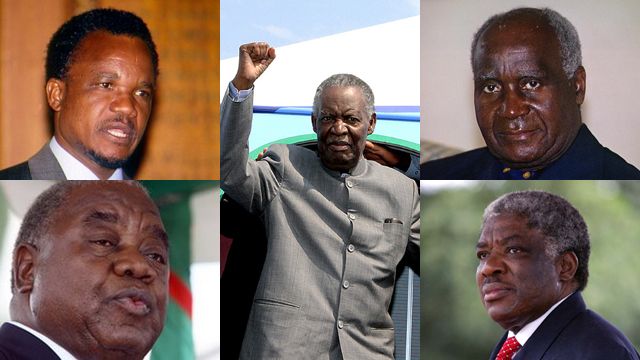| Home » Files » My files |
Federation for Small scale Mining Association in Zambia
| 15 January 2013, 2:47:30 | |
| The president of the Federation for Small Scale Mining Association in Zambia (FESSMAZ), Marc Kalemba was at pain to express the many challenges his members are up against, in an interview with Commerce Gazette. If foreigners can acquire wealth using our local raw natural resource, why shouldn’t Zambians? The basic difference between foreign investors and local entrepreneurs is access to financial resource, technical support and marketing which they have and we don’t. As a result the middle men and illegal miners are making exorbitant profits on the sweat and hard work of our small scale miners who continue mining because of poverty. We believe the current system that government has put in place is not benefiting local small scale miners. The Mining Act clearly states that licenses in industrial minerals are restricted to Zambians. This law covers industrial minerals and precious stones. Unfortunately you find a lot of foreigners in the sector. We have witnessed a lot of Chinese, Lebanese and Asians in quarrying where foreigners are forbidden. The Chinese have penetrated the small-scale mining sector however, they are not adding any value to it. The numbers of Chinese mining in North Western and Luapula provinces are staggering. We wonder how they are getting there, who is allowing them and how they are getting the licenses if at all. Most of their partners are not registered with our Federation,or any other local associations. It’s a very sad picture. The Act also says that no mining can take place in Zambia without a license, yet this is the most violated law. Very few people have been penalized over mining without a license. We have been trying to inquire from government how this is possible however, we always hit a brick wall. We used to blame the previously [MMD] government and we thought when the new [PF] government comes in they will correct these anomalies going by their well eloborated small mining policy in their manifesto. We are yet to see what they can do about this. As a Federation we represent about 3,000 members from all provinces in Zambia with an additional 25,000 more benefiting from the small scale mines through job creation. The current government is fully aware of our sentiments and we’ve continued crying about it. As president of FESSMAZ, I stated our support of the ban of the issuance of licenses when the PF government came in power because we knew that there was a lot of corruption going on at Cadaster. However we are surprised by government’s recent announcement that it will lift the ban, May 30th. We made a comment to say that let the government tell us what they have discovered during the ban, because the ban implied that they were possibly investigation these matters. What corrections have they made that will satisfy us as stakeholders that the ban was worthwhile. We believe government can address the challenges small scale miners are facing through policy and implementation of laws that already exist. As FESSMAZ we are undertaking a baseline survey with ZCCM-IH that will assist with data collection to develop the sector. Additionally, ZCCMIH assistance to small scale miners will be distributed in a transparent and equitable manner going by the data collected. The survey should subsequently assist small scale miners to enter into joint ventures with ZCCM-IH that will bring real investment in small scale mining as opposed to what is happening now. We believe that regional connections will also enable us to form the necessary networks that we don’t have which foreign investors have, enabling them to manipulate the sector to their benefit. By working with the regional body, we will have the facility and access to obtain information on what is happening on the global market. The regional body will be able to advise the regional states on how to formulate the laws to suit the global trends so that the small-scale mining sector can benefit. The influence that individual African countries have on the mineral markets is minimal.By working as a group through institutions such as the Common Market for Eastern and Southern Africa (COMESA) small-scale mining will develop faster. We are interested in forming alliances with small-scale miners in Namibia, Zimbabwe and countries in the Great Lakes region. Among the mineral being mined in the Great Lakes region is the rare earth which is being used in the manufacturing of cellphone technology. It is sad that poorly organized small scale mining sector in the Great lakes region are fighting each other and other exploitative groups and war factions that are benefiting from the sector. However, the better organized small scale mining becomes in the region, the quicker the wars will end. The major minerals we mine in Zambia are gemstones, base metals and industrial minerals. The precious stones are emeralds, rubies and diamonds. We also have gold being mined at Kansanshi mine. Semi precious stones are amethyst, aquamarine and tourmalines. The lack of technical and marketing support are among the main impediments against small scale miners becoming sustainable. We are looking forward to adding value to our gemstones and base metals which are mostly sold raw. The addition of value is problematic in Zambia and we don’t have forward linkage industries to get a fair market price for our products. The lapidary in Ndola, which is supposed to polishing our gemstones is unfortunately under preforming due to most of our stones being sold raw and illegally outside the country making it unsustainable. FESSMAZ is aware that what is declared as production to the Ministry of Mines on the monthly returns is inconsistent with the sales of gemstones coming from Zambia on the international markets. The submission of monthly returns is used by ZRA to impose tax on each mine as well as inform government on the quantities produced. On a recent trip to China, Zambian officials found huge stockpiles of manganese from Luapula which does not tally with the export statistics. Similarly in America while attending an exhibition, it was shocking to find that some of the gemstones they were selling are Zambian. The illegal gemstones are undermining the price of the legal stones sold because of the huge quantities available. This is true of amethyst which is sold cheaply in the Far East. Our expectation is that government will encourage investors to set up factories in Zambia that will add value to our stones curbing the sell of raw gemstones abroad. It is unfortunate that government has not done much to encourage the people crushing stones, most of them women, to belong to an association. They are causing a lot of environmental hazard. These miners are supposed to be under a department with FESSMAZ. However, they prefer to operate like vendors. Had they belonged to our association, we could have lobbied government to allocate them quarrying areas away from the residential areas as is currently happening, they are destroying the town. The mining of dolomite, sand, talc, limestone and gravel is not a very expensive venture as we have them in large quantities. However, investors are driven by profit motives. When it comes to operation they employ methods that will give them maximum profits. Despite acquiring the major raw material cheaply from shallow open pits and importing chemicals from abroad, the cost of cement is not supposed to be as high as it is. Therefore, is no justification for the high cost of cement. The problem is that we have never had local investors who have gone serious into mining these commodities. The major businesses crushing limestone for cement are foreigners. Under UNIP the industries like Chilanga Cement were government parastals which should have graduated as indigenous companies and maybe we could have seen the development of this sector. With foreign investors running these companies their operations are very restrictive. So much that we can not even interact with them which is why they do not participate in our meetings. The only advantage with the entrance of Dangote coming in the manufacturing of cement is that the competition may force the price to reduce. If small scale mining was not profitable and sustainable why are there so many foreigner coming into the sector? It is unfortunate that while foreign investors have access to cheap financing from their banks abroad, our smaller scale miners have never been able to access financing locally. It is unfortunate that Zambian banks are bias against borrowing to local miners whom they term as risky. Maybe if there were successful local mining entrepreneurs this perception would change. However, our miners are not given that opportunity and this is why government policy must come to bear in the sector. | |
| Views: 46256 | Downloads: 0 | Comments: 11 | | |
| Total comments: 2 | |
|
| |


